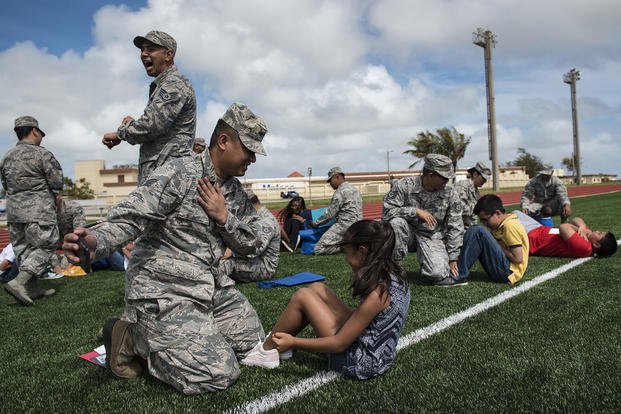Aside from what you see in movies, what do you know about the military?
It turns out there's a pretty big knowledge gap nowadays when it comes to what civilians know about military life. Young people especially seem to have a lot of misconceptions about what it's like to serve.
For instance, according to the Defense Department's Joint Advertising Market Research and Studies program, only 50% of young adults ages 17-35 could name all four active-duty military services; 36% didn't know there was a difference between an officer and an enlisted person.
That should be pretty standard knowledge, but that's not the case anymore. So to help clear up some myths and concerns that young people have, here's the truth about a few other common misconceptions.
You Won't Be in Contact with Family and Friends.
According to JAMRS, 50% of young people thought that joining the military meant it would be harder to stay in touch.
Smartphone capabilities and other tech advances have made communication easier than ever. Skype, Facetime or any of the other many video-chatting services have given deployed service members the ability to be in touch with their families and friends at any time of day from some of the world's most remote areas.
Military Life Is Incompatible with Having a Family.
When young people think about the military, some believe it can be a lonely life that involves lots of location changes and deployments. While there is a lot of moving in the military, it's very family oriented. In fact, 52% of the enlisted force is married, while 70% of the officer corps is. That's higher than the U.S. average of about 48%, according to Census Bureau statistics from 2011.
You Get Penalized if You Become Pregnant.
Some young people actually believed this, but it's definitely false. In fact, the DoD offers some of the best maternity leave available in the U.S.
Earlier this year, maternity leave was expanded to 12 continuous weeks for all new moms serving in uniform. The DoD also is working to expand paternity leave for dads, too.
In fact, if you're worried about this subject, check out our blog about the expanded reforms that are helping -- not hurting -- families.
You Have Fewer Chances to Earn Money for College.
Not true. In the past decade, the GI Bill has helped more than 2.3 million veterans pay for college. And did you know that there are actually several options for educational benefits under the GI Bill? There's the Montgomery GI Bill for active-duty and select reserve service members, as well as benefit programs for disabled veterans. There's also the Post-9/11 GI Bill, which offers more than just help with tuition and fees. It also offers a living allowance, money for textbooks and even the option to transfer education benefits that service members don't use to their spouse or children.
Many service members are also able to get their degree while on active duty. Then there's the ROTC (the Reserve Officer Training Corps, if you're unfamiliar with it), which trains college students for future service. About 120,000 people have benefited from ROTC scholarships in the past decade.
Veterans Don't Know What to Do when They Return to 'the Real World.'
Like anything else, when you leave one way of life for another, it can be a transition. Moving cross country. Leaving home for college. Those all represent a big change, but people adjust, and it's no different for veterans.
Sure, there's definitely a transition period when you leave the military, but there are several programs that help service members with transition and separation, including the Hiring our Heroes program.
And if you're thinking that your job skills won't transfer, that's a myth, too. People forget that the military has all sorts of opportunities -- from cooking to doing scientific research to public affairs -- and a lot of those skills are extremely transferable. Not only that, but in the military, you get a crash course in dependability, reliability, teamwork, team building, leadership, handling stress, decision-making and critical thinking. Those qualities are highly valuable to employers in the civilian sector. So, just like any civilian who might transfer from one job to another, people with military backgrounds can do that, too.
Need help with your civilian resume, or tips on how to interview? The military has that covered. And if you're looking for a career change when you leave, as we've shown above, there's lots of help to get you where you want to be!
Hopefully this has helped dispel some rumors about what military life is like. At the end of the day, it's not so different from the lives our civilian friends live.
Interested in Joining the Military?
We can put you in touch with recruiters from the different military branches. Learn about the benefits of serving your country, paying for school, military career paths, and more: sign up now and hear from a recruiter near you.















